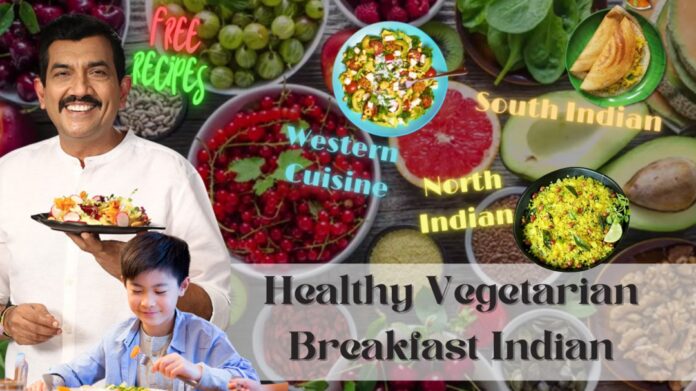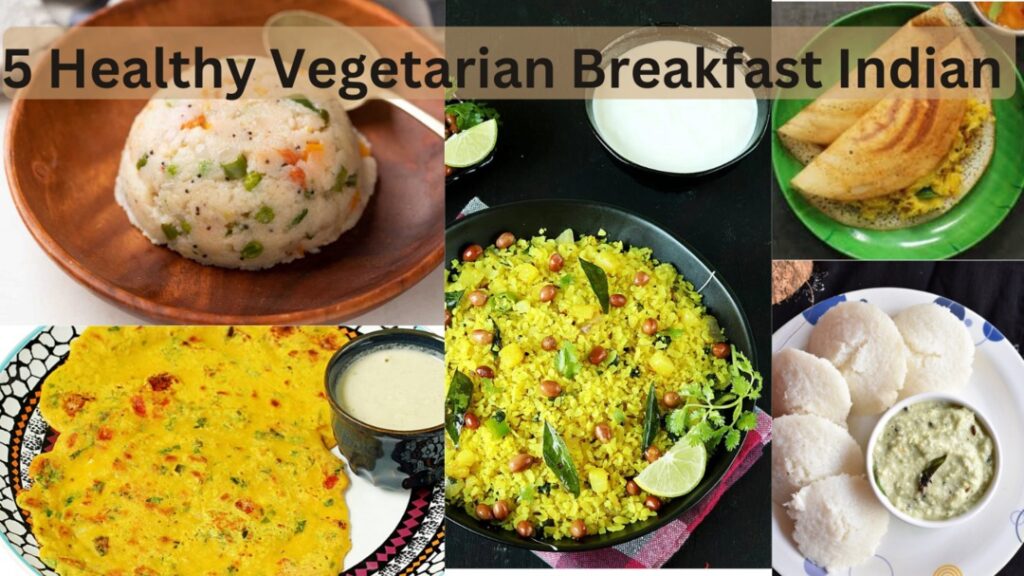
Healthy Vegetarian Breakfast Indian is often hailed as the most important meal of the day, and for good reason. It kick-starts our metabolism, refuels our glycogen stores, and provides essential nutrients to fuel our day ahead.
In the vibrant tapestry of Indian cuisine, breakfast holds a special place, offering a plethora of options, especially for vegetarians.
From savory to sweet, spicy to mild, a healthy vegetarian Indian breakfast is not just about satiating hunger but also about nourishing the body with a rich array of flavors, textures, and nutrients.
Let’s explore the benefits, preparation, and significance of each ingredient in crafting a wholesome morning meal.
Healthy Vegetarian Breakfast Indian 5 Healthy Vegetarian Breakfast Indian
- Vegetable Upma
- Poha
- Masala Dosa
- Besan Chilla
- Idli with coconut chutney

The Benefits of a Healthy Vegetarian Breakfast Indian: Healthy Vegetarian Breakfast Indian
Balanced Nutrition: A well-rounded vegetarian Indian breakfast typically includes a combination of grains, pulses, dairy, fruits, and vegetables, providing a balanced mix of macronutrients (carbohydrates, protein, and fats), vitamins, minerals, and dietary fiber essential for optimal health.
Sustained Energy: Complex carbohydrates from whole grains like oats, millets, or whole wheat, along with protein-rich ingredients like lentils, paneer (Indian cottage cheese), and yogurt, provide sustained energy throughout the morning, keeping you fueled and focused.
Digestive Health: Many traditional Indian breakfast items incorporate probiotic-rich foods like yogurt and fermented rice preparations like idlis and dosas, promoting gut health and aiding digestion. Additionally, the fiber from vegetables and whole grains supports regular bowel movements and overall digestive well-being.
Weight Management: A vegetarian Indian breakfast can be an ally in weight management endeavors due to its high fiber content and lower saturated fat content compared to meat-based options. Fiber-rich foods help keep you feeling full for longer, reducing the likelihood of overeating later in the day.
Heart Health: With a focus on plant-based ingredients, a vegetarian Indian breakfast tends to be low in cholesterol and saturated fats, which are associated with an increased risk of heart disease.
Ingredients like fenugreek seeds (methi), flaxseeds, and almonds, commonly used in Indian breakfast recipes, contribute to heart health by lowering cholesterol levels and improving lipid profiles.
Preparation of a Healthy Vegetarian Indian Breakfast:
Whole Grain Goodness: Healthy Vegetarian Breakfast Indian
Start with a base of whole grains such as oats, millets, quinoa, or whole wheat.
Cook grains according to package instructions or traditional methods like pressure cooking for optimal nutrient retention.
Protein Powerhouses:
Incorporate protein-rich foods like lentils (dal), chickpeas (chana), black-eyed peas (lobia), or paneer (cottage cheese).
Prepare lentils by soaking and pressure cooking or simmering until tender. Paneer can be cubed and lightly sautéed for added flavor and texture.
Flavorful Spices and Herbs:
Elevate the taste profile with aromatic spices like cumin, coriander, turmeric, and mustard seeds.
Fresh herbs like cilantro, mint, and curry leaves add brightness and freshness to dishes.
Nutrient-Dense Additions:
Enhance nutritional value with vegetables such as spinach, tomatoes, bell peppers, and onions.
Include nuts and seeds like almonds, cashews, flaxseeds, and sesame seeds for added crunch, texture, and healthy fats.
Dairy Delights:
Dairy products like yogurt (curd), buttermilk (lassi), and milk are integral to many Indian breakfast recipes.
Opt for low-fat or plant-based alternatives for a healthier twist.
Importance of Each Ingredient:
Whole Grains:
Rich in complex carbohydrates and fiber, whole grains provide sustained energy and support digestive health.
Pulses and Legumes:
Excellent sources of plant-based protein, pulses and legumes contribute to muscle repair and growth, as well as providing essential amino acids.
Fresh Vegetables:
Packed with vitamins, minerals, and antioxidants, vegetables add color, flavor, and nutritional value to breakfast dishes, supporting overall health and well-being.
Spices and Herbs:
Besides imparting unique flavors and aromas, spices and herbs like turmeric, ginger, and garlic possess anti-inflammatory and immune-boosting properties, promoting health from within.
Nuts and Seeds:
High in heart-healthy fats, protein, and micronutrients like vitamin E and magnesium, nuts and seeds offer a nutritional boost and add texture to breakfast preparations.
Dairy Products:
Rich in calcium, vitamin D, and probiotics, dairy products contribute to bone health, gut health, and overall immunity.
Conclusion: Healthy Vegetarian Breakfast Indian
A healthy vegetarian Indian breakfast is a celebration of flavors, textures, and nutrients that nourish both body and soul.
From the wholesome goodness of whole grains and pulses to the vibrant colors of fresh vegetables and aromatic spices, each ingredient plays a vital role in creating a morning meal that energizes, sustains, and nurtures.
By embracing the diversity and richness of Indian cuisine, we embark on a journey of holistic well-being, one delicious breakfast at a time.
What are some common vegetarian Indian breakfast dishes?
Common vegetarian Indian breakfast dishes include idli, dosa, upma, poha, paratha, chilla, uttapam, dhokla, and various types of Indian bread like roti, puri, and thepla.
Are vegetarian Indian breakfasts healthy?
Yes, vegetarian Indian breakfasts can be very healthy. They often incorporate whole grains, pulses, vegetables, and dairy, providing a good balance of macronutrients, vitamins, minerals, and fiber. However, the healthiness of a dish also depends on factors like portion size, cooking methods, and added fats or sugars.
Can I prepare vegetarian Indian breakfasts in advance?
Yes, many vegetarian Indian breakfast dishes can be prepared in advance and stored for later use. For example, you can make dosa batter and store it in the refrigerator for a few days, or prepare parathas and freeze them for future use. Upma, poha, and idli batter can also be made in advance and refrigerated.
Are there any gluten-free options for vegetarian Indian breakfasts?
Yes, there are several gluten-free options for vegetarian Indian breakfasts. Dishes like idli, dosa (made from rice and lentil batter), poha (flattened rice), and dhokla (made from chickpea flour) are naturally gluten-free. Additionally, you can use gluten-free flours like chickpea flour (besan) or rice flour to make chillas, parathas, or pancakes.
What are some accompaniments for vegetarian Indian breakfasts?
Vegetarian Indian breakfasts are often served with a variety of accompaniments like chutneys (coconut chutney, mint chutney, tomato chutney), pickles, yogurt (curd), and sambar (a lentil-based vegetable stew). These accompaniments complement the flavors of the main dishes and add an extra dimension to the meal.
Are vegetarian Indian breakfasts suitable for vegans?
Many vegetarian Indian breakfast dishes can be easily modified to suit a vegan diet. For example, dairy products like milk, yogurt, and ghee can be replaced with plant-based alternatives like almond milk, coconut yogurt, and vegetable oil. Additionally, ingredients like paneer (cottage cheese) can be omitted or substituted with tofu or vegetables.




[…] its secrets and benefits.What is the rule for intermittent fasting ? Intermittent fasting is not a diet per se, but rather an eating pattern that cycles between periods of fasting and eating. Unlike […]
[…] Detox water, often referred to as infused water, is a popular health trend that involves adding a variety of fruits, vegetables, and herbs to water. This not only enhances the flavor but also purportedly aids in detoxifying the body, promoting weight loss, and improving overall health. […]